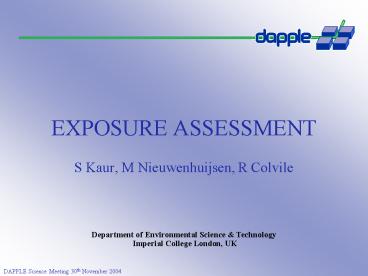EXPOSURE ASSESSMENT PowerPoint PPT Presentation
1 / 18
Title: EXPOSURE ASSESSMENT
1
EXPOSURE ASSESSMENT
- S Kaur, M Nieuwenhuijsen, R Colvile
Department of Environmental Science Technology
Imperial College London, UK
DAPPLE Science Meeting 30th November 2004
2
Aims Objectives
- Characterise and evaluate human exposure levels
at and around a street canyon intersection to CO
and fine particulate matter - Assess variations in exposure between and within
i) modes of transport, ii) routes and iii)
timings - Examine the relationship between human exposure
to PM2.5 and CO at and around a street canyon
intersection in relation to fixed site monitored
concentrations - Identify and quantify the main determinants of
human exposure at and around a street canyon
intersection - Consider the policy implications arising from the
research
DAPPLE Science Meeting 30th November 2004
3
2003 Field Measurements
DAPPLE Science Meeting 30th November 2004
4
Results Data Capture
- 481 samples collected, 394 acceptable samples
Overall Exposure to Pollutant N AM A SD Min. Max.
PM2.5 (µg/m3) 197 33.6 14.5 5.3 77.5
Ultrafine Particle Counts (pt/cm3) 86 88101 31291 36474 178601
CO (ppm) 111 1.0 0.7 0.0 2.9
DAPPLE Science Meeting 30th November 2004
5
Results Timings
PM2.5 (µg/m) Ultrafine Particle Counts (pt/cm3) Ultrafine Particle Counts (pt/cm3) Ultrafine Particle Counts (pt/cm3) CO (ppm)
Timing 1 2 3 1 2 3 1 2 3
Timing (8.30am) (12.00pm) (3.15pm) (8.30am) (12.00pm) (3.15pm) (8.30am) (12.00pm) (3.15pm)
N 61 63 61 31 28 27 37 38 36
AM 34.6 28.8 35.6 106270 79188 76483 1.5 0.7 0.8
ASD 14.1 12.3 14.8 34075 25487 23818 0.7 0.5 0.5
Min. 12.5 6.0 5.3 52530 36679 36474 0.2 0.0 0.0
Max. 66.5 55.9 77.5 178601 128979 127326 2.9 2.0 1.8
DAPPLE Science Meeting 30th November 2004
6
Results Modes of Transport
DAPPLE Science Meeting 30th November 2004
7
Results Routes
N AM A SD Min. Max.
PM2.5 (µg/m3) PM2.5 (µg/m3)
Marylebone Road Circuit 100 35.3 14.0 6.0 77.5
Gloucester Place Backstreets 97 31.8 14.7 5.3 71.8
Ultrafine Particle Count (pt/cm3) Ultrafine Particle Count (pt/cm3)
Marylebone Road Circuit 48 101142 29186 47300 178601
Gloucester Place Backstreets 38 71628 25844 36474 158685
Carbon Monoxide (ppm) Carbon Monoxide (ppm)
Marylebone Road Circuit 61 1.3 0.6 0.4 2.9
Gloucester Place Backstreets 50 0.6 0.5 0.0 2.0
DAPPLE Science Meeting 30th November 2004
8
Correlations between Pollutants
DAPPLE Science Meeting 30th November 2004
9
Ambient Monitoring
DAPPLE Science Meeting 30th November 2004
10
Results Other
DAPPLE Science Meeting 30th November 2004
11
Data Analysed/Available (2003)
DAPPLE Science Meeting 30th November 2004
12
Aims Objectives
- Characterise and evaluate human exposure levels
at and around a street canyon intersection to CO
and fine particulate matter? - Assess variations in exposure between and within
i) modes of transport, ii) routes and iii)
timings ? - Examine the relationship between human exposure
to PM2.5 and CO at and around a street canyon
intersection in relation to fixed site monitored
concentrations ? - Identify and quantify the main determinants of
human exposure at and around a street canyon
intersection - Consider the policy implications arising from the
research
DAPPLE Science Meeting 30th November 2004
13
2004 Field Measurements
DAPPLE Science Meeting 30th November 2004
14
2004 Field Data Status
DAPPLE Science Meeting 30th November 2004
15
Analysis of Determinants of Exp.
- Identify and quantify the determinants of
exposure - Regression the model assumes personal exposure
is a function of independent variables (e.g. wind
speed, wind direction, traffic densityetc) with
a normally distributed random error - Dependent on meteorological and traffic data
availability - Start with 2003 data
DAPPLE Science Meeting 30th November 2004
16
Timeline
- Nov 2004 Descriptive work for 2003 data
complete - Dec 2004 Start data collection for regression
analysis from other groups - Jan 2005 Descriptive work for 2004 data
complete - Mar/Apr ? 2005 Basic analysis of determinants
of exposure for 2003 data complete - ????? Detailed analysis of determinants for 2003
data - ????? Analysis of determinants for 2004 data
DAPPLE Science Meeting 30th November 2004
17
Collaborators
- Health Safety Laboratory, Sheffield (2003
2004) exposure visualisation - UCL testing GPS and CO sensors
- NERI requested fieldwork completed, awaiting
funding
DAPPLE Science Meeting 30th November 2004
18
Bus Measurements
- Top graph example of timeseries ultrafine
particle count at a bus stop (westbound,
downstream of DAPPLE site on number 18 route)
including peaks associated with arrival and
departure of buses - Lower graph average timeseries ultrafine
particle count measured on multiple journeys
between Edgware Road and Regents Park stations on
number 18 route, including the section through
the DAPPLE site. - Use of data to model exposure
- Combine concentration at bus stop with total
waiting time and number of people waiting - Combine concentration on bus with journey time
and bus occupancy - Note that most people experience the more
polluted, delayed journeys! Clean buses have
nobody on them!
DAPPLE Science Meeting 30th November 2004

